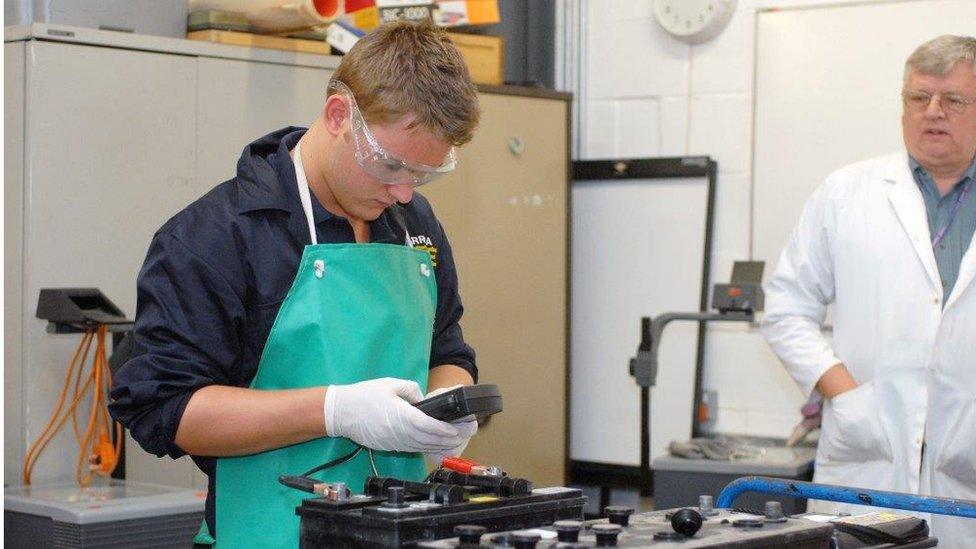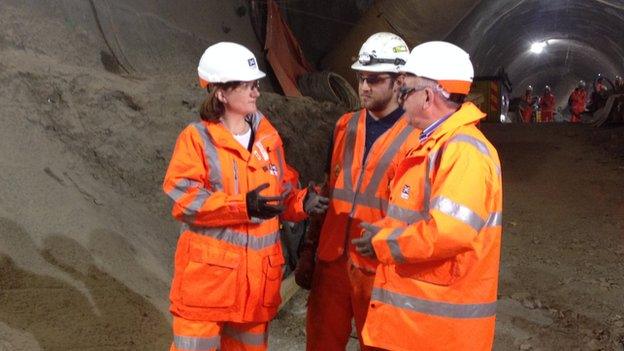Chaotic careers education harms economy, says Ofsted
- Published

Schools need to make sure pupils are ready for the world of work, says Ofsted
Chaotic careers education in England's schools could jeopardise the UK's future economic prosperity, says education watchdog Ofsted.
Lack of an "overarching government strategy" means a generation is leaving school unready for work, it argues.
The UK's post-Brexit success depends on harnessing "home-grown talent", says chief inspector Sir Michael Wilshaw.
The government said its strategy was "to open young people's eyes to many opportunities and choices".
Earlier this month MPs accused ministers of "burying their heads in the sand" over careers education.
Ofsted's report, external wants the government to do more to promote "enterprise education" in schools "including the promotion of economic and business understanding and financial capability" among pupils.
Ofsted urges the government to "revisit" recommendations made in a report by Lord Young , external published by the government in 2014, which urged greater emphasis on work-related learning in schools.
Lord Young said the economy was increasingly driven by small start-up firms employing fewer than 10 people and that young people would need greater self-reliance, creativity and an enterprising attitude to prosper in this new economic climate.
But of 40 secondary schools visited by Ofsted earlier this year, it said only four put enough emphasis on work-related learning.
Inspectors also found too many schools:
Did not consider work-related education important
Had weak links with local businesses
Were unsure about the external careers education support on offer
Poor co-ordination between schools and businesses on careers and enterprise education was particularly damaging for children from disadvantaged backgrounds, said Sir Michael.
"It is really important that schools are providing the right opportunities, working effectively with local businesses to offer their pupils the chance to understand how businesses work.
"This is even more important for people from disadvantaged backgrounds."
He said pupils from all backgrounds should "have access to an education that prepares them well for the next stage of their lives, be that higher education, entering employment or setting up their own business".

The government should do more to promote apprenticeships, says the report
The report also said that the Careers and Enterprise Company, set up by the government two years ago to help co-ordinate relationships between schools and businesses, was still at "an embryonic stage" and schools and businesses were "largely unaware of its existence".
The report urges better government support for the Careers and Enterprise Company as well as the promotion of apprenticeships.
It also urges that:
Ofsted inspections should include how schools prepare pupils for employment and self-employment,
Schools should work better with businesses on economic, business and enterprise education
Employers should offer more support in the form of mock interviews, careers talks and work experience
Careers and Enterprise Company chief executive Claudia Harris said it had been set up only a year ago and had made rapid progression "from a standing start".
Simon Walker, director general of the Institute of Directors, said stronger relationships between schools and employers would be vital "in a period of massive change" and called for "a cultural shift within the education sector".
"Ofsted should put less of a focus on exam results," said Mr Walker.
A Department for Education spokeswoman said the government planned to invest £90m on careers guidance over four years, including The Careers and Enterprise Company and telephone support for thousands of teenagers through the National Careers Service.
"Every child deserves an excellent education and schools have a statutory duty to provide high-quality careers advice as part of that," she said.
- Published1 November 2016

- Published5 July 2016

- Published10 December 2014

- Published10 September 2014
